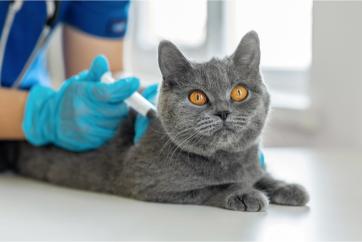All About Cat Vaccines

The Urban Pet knows that you want the best for your cat (and we do, too!). So what’s the deal with cat vaccines? What does your cat need? What do kitten vaccine schedules look like? Keep reading to learn all you need to know about cat vaccines.
What’s a Vaccine Anyways?
Most pet owners appreciate that vaccinations are an important part of pet wellness care. But what actually is a vaccine?
A vaccination is a biological product that we inject strategically to prepare a pet’s body to fight off disease-causing organisms. The vaccine allows the body to make antibodies and learn to recognize a particular virus or bacteria. This means that a vaccinated pet is better equipped to fight off a disease than one who has not been vaccinated.
Common Cat Vaccines
Not all cats need all vaccines, but most cats need some vaccines. Individual lifestyle and risk factors help us to determine which vaccines are needed for which pets.
Common cat vaccines include:
- Rabies: The state of Tennessee requires all dogs and cats over the age of six months of age to be vaccinated against rabies. Because rabies is a human health concern, we don’t take this disease lightly.
- Feline distemper combination vaccine: Sometimes called FVRCP, this vaccine protects cats against several serious diseases including feline rhinotracheitis, calicivirus, and panleukopenia (distemper). Nearly all cats should receive this vaccine.
- Feline Leukemia (FeLV): Feline leukemia is a serious and contagious feline disease. Infected cats experience immunosuppression and tumor formation. Cats who go outdoors, live in households with other infected cats, or kittens are at highest risk.
All About Vaccine Schedules
It can be confusing to know when your cat should receive what vaccine. Don’t worry, though, our team will help!
In general, most pets fall into one of two categories:
- Need for boosters: Kittens, cats who are receiving vaccines for the first time, and pets with an unknown vaccination history need a little extra help to get their immune systems running at peak capacity. Our kitten vaccines schedule starts around six weeks of age, and then boosters are recommended every three weeks or so until the pet is over four months old. Animals who have not been vaccinated before but are adults will only need one booster for most vaccines. Boostering your pet as recommended ensures the best immunity.
- Adult vaccine schedule: Once a cat has received their initial vaccinations and boosters, they won’t need to visit us so often. We will discuss an annual or triennial vaccination rotation depending on your pet’s needs.
Vaccines are an invaluable tool that we can use to prevent serious disease in our feline friends. Contact us to discuss which vaccinations are necessary for your pet any time. We are honored to answer all your questions or concerns.
